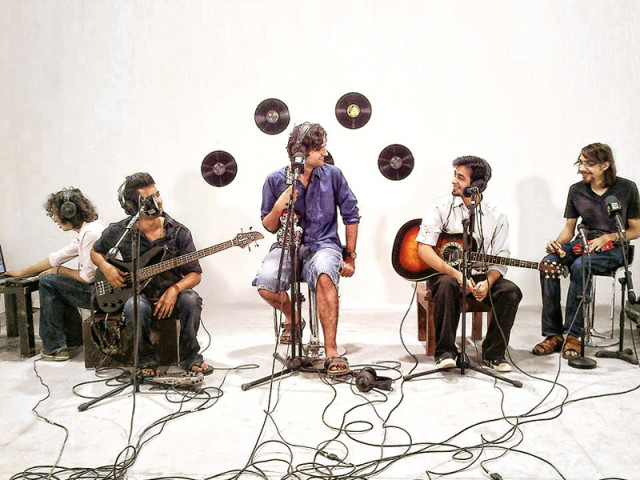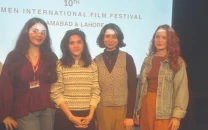War of Indie-Pendence
Inexpensive equipment means local bands can now record and release music without giving in to popular trends.

Sikandar ka Mandar
The word ‘Indie’ comes from ‘independent’. And while such musicians in other parts of the world do manage to make a decent income without the help of major record labels, most of them in Pakistan are shelling out money from their own pockets to make music.
But that doesn’t keep these 20-somethings from recording and releasing their tracks, especially when elaborate studio equipment or acoustically treated rooms are not necessarily required to create a great sounding record. No label required either; upload your songs on to one of the popular music-sharing sites such as SoundCloud, or better yet, shoot a video with your inexpensive DSLR camera.
“It’s about doing something in the day for work and doing what makes you happy at night,” says doctor-slash-musician Salman Younus Khan. Younas and Saad Munzar, who together form Basheer & The Pied Pipers, went to medical school. But they couldn’t resist the lure of a good tune. Their dense, hypnotic music illustrates why these two chose the profession they did — ghastly sounds don’t make their stomachs churn. They have two EPs under their belt, ‘Basheer’ and ‘Paperclouds’. Both exhibit a fair bit of musicianship and computer trickery.
Most ‘underground’ bands in the past have relied on an overdose of guitars, but the trend is now changing. The guy with the acoustic guitar around a bonfire isn’t attracting a lot of attention from the girls, because frankly, there are very few bonfires. With all the musicians and music enthusiasts huddled up in front of their computers, a strange blend of electronic and organic sounds is brewing.

//Orangenoise presents a problem before a listen. How do you pronounce a name that begins with two forward slashes? These self-proclaimed ‘psychedelic chappalgazers’ (a throwback on the term ‘navel gazing’) need a manual to explain the quirky references they throw out. Shoegazing is a sub-genre of alternative rock. It often includes an army of stomp boxes and effects pedals that the musician may set foot on at his discretion; hence, the term shoegazing and ‘Chappalgazers’.
//Orangenoise performed in Uth Records, produced by Pakistan’s ace drummer ‘Gumby’, in 2012. They also get regular airplay on local and international radio. The band was even featured on social news and entertainment website Reddit’s Listen To This Best of 2012.
The noise in their album A Journey to the Heart of Matter is quite agreeable. Most effects are wrapped over live instruments, indicating that the band is not using them as a crutch but as an extension of their ideas. They may be fond of creating a racket, but some sing-along moments ensure it’s not all orange: the blues peek through, albeit briefly.
Unsurprisingly, frontman Talha Asim Wynne points out that his band is not looking for superstardom. “A small label is all right, but as an indie band, a big*** label is just not us,” he says.
Popularity is a strange thanksgiving, often finding refuge in the unlikeliest of places. And Lahore-based Poor Rich Boy might have seen a glimpse of this, dare we say, fair weather friend. Plucking the ukulele strings, this folksy outfit is stirring hearts with their hummable songs and poignant lyrics. Those who give them a listen are bound to be smitten.

Comprising, among others, teachers of music and literature, the band Poor Rich Boy possess a rare finesse. As a result, the insight reflected in their songs is hard to miss. This band tackles complex subjects with simple earnestness and its work is layered with messages of love and politics. For example, the song Fair Weather Friend is about our relationship with China. Unfortunately, they have chosen to write their songs in English, and that too using metaphors and vocabulary most will frown upon. ‘Silver-tongued seraphim circling the spire’ being a case in point.
But not all bands are consciously trying to dodge fame or stand out. “I’ve never thought of what sets my music apart from everyone else’s. That doesn’t matter much to me,” says Shajie Hassan, frontman of indie-rock band ‘Shajie’. “All that matters, is [that] it leaves me content and that’s about all I expect from it.”
Shajie’s three singles — Dosti Pyar, Oonchay Dost and Battakhain — are already doing the rounds on social media and radio. They also released a new song called Hockey on an episode of City Sessions FM89. Judging by his songs, Shajie does not seem averse to the idea of mainstream appreciation.
Another talented musician who plays for a number of bands echoes the sentiment. “We have no reservations over the idea of going commercial as long as the suits aren’t asking us to do a rock rendition of Billo de Ghar,” Muhammad Ali Suhail says of one of his ventures called Jumbo Jutt.
He is, however, as terrified of the idea of having to compromise on his music for commercial gains as the others. “With all my projects, you can tell I love and play all kinds of music. But I’m ‘indie’ by default. Not many people help independent musicians grow here. We have to do things on our own.”
And the 24-year-old is doing many things. He plays a number of stringed instruments (ukulele, banjo, guitar and bass) for a number of bands — Jumbo Jutt, Sikandar ka Mandar, Joomi and Shajie. Suhail’s solo expedition in the form of an EP titled Words from Boxes shows he will continue to make music, with or without a little help from his friends.
But music loves company. And Nadir Shahzad Khan from Sikandar ka Mandar is adamant about providing indie musicians a platform to perform and collaborate. His initiative ‘Lussun TV’ is a music and skit show featuring lesser known bands experimenting with all sorts of sounds.
The idea for the project came to Nadir in 2010 when he began to make funny videos for YouTube with his friends. He later added a song here and a song there and the whole thing came to life. Eventually, with the help of music producer Rohail Hyatt, Nadir was able to turn it into a regular show. //Orangenoise, Mole and Basheer & The Pied Pipers are some of the bands that have featured in the first two seasons while the third is set to be released in about a month.
After the YouTube ban was imposed last September, Nadir had to find another forum for his show. Undeterred, he chose video-sharing site Vimeo to release the episodes, using Facebook and other social networking sites to promote the music.
The ban on YouTube has been a huge loss for musicians in terms of outreach. The video-sharing site allowed virtually unknown artists such as Ali Gul Pir and Beghairat Brigade to go viral. But just like the latter’s song Dhinak Dhinak has indicated, censorship in the country is an arbitrary affair and if musicians are to continue making music they need to be prepared to suffer more than a few setbacks.
Some have not relied on videos at all. Bumbu Sauce came up with a grinding rock tune Mojambo that caught attention as soon as it hit the airwaves across the country. Abundant airplay on radio helped the band attract fans and soon the word caught on. Replete with driving guitar riffs and tongue-in-cheek lyrics, Bambu Sauce got young listeners scratching their heads asking, ‘what is the scene?’
The scene, however, is serene. There are few concerts and even fewer for bands making the kind of music most indie musicians do. In the absence of having the opportunity to play in front of an audience, the art of performance has suffered a significant blow. Only a handful of places such as The 2nd Floor and MAD School in Karachi and The Guitar School in Lahore allow musicians to perform in front a select but appreciative audience.
Of course those who do come to listen to these bands love the music and their support keeps the musicians going. “We perform once a month on average and our audience is about 150 to 200 people. What matters is that it is a very loyal cult of people,” says Nadir.
Being loyal to their music is what these bands consider a sacred vow. None of them are willing to ‘sell their soul’. Unconsciously or otherwise, these musicians are relentlessly swimming against the tides of conformity. They insist on creating what is to them an expression of their selves. But the music is not always inaccessible — the hipsters on the other side are as unconventional. And the language is universal.
Published in The Express Tribune, Sunday Magazine, September 22nd, 2013.



















COMMENTS
Comments are moderated and generally will be posted if they are on-topic and not abusive.
For more information, please see our Comments FAQ